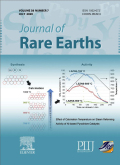- 钛学术文献服务平台 \
- 学术期刊 \
- 工业技术期刊 \
- 冶金工业期刊 \
- 稀土学报(英文版)期刊 \
Mechanism of CeO2 synthesized by thermal decomposition of Ce-MOF and its performance of benzene catalytic combustion☆
Mechanism of CeO2 synthesized by thermal decomposition of Ce-MOF and its performance of benzene catalytic combustion☆
基本信息来源于合作网站,原文需代理用户跳转至来源网站获取
摘要:
In this paper, the formation mechanism of mesoporous CeO2 synthesized by thermal decomposition of Ce-MOF and its performance of benzene catalytic combustion, as well as the structure-activity rela-tionship between them were studied in depth. The self-assembly process and physicochemical proper-ties of CeO2 were characterized by thermogravimetry analysis, powder X-ray diffraction, N2 adsorption/desorption, high-resolution transmission electron microscopy and X-ray photoelectron spectroscopy techniques. Characterization results show that Ce-MOF is completely decomposed into pure mesoporous CeO2 when the decomposition temperature is higher than 400 C. At this threshold temperature, CeO2 (400) has the largest specific surface area and pore volume of 114 m2/g and 0.152 cm3/g, respectively. CeO2 (400) exhibits very high catalytic activity for benzene combustion, which can completely catalyze the degradation of benzene at 260 ℃. Meanwhile, the mesoporous CeO2 (400) supported Pt nano-crystalline catalysts were prepared by high temperature solution-phase reduction method. Pt/CeO2 (400) can completely degrade benzene at about 200 ℃ and represents high durability and good water-resistance for benzene combustion during 100 h of continuous reaction.

推荐文章
Au/CeO2、Pd/CeO2和Au-Pd/CeO2催化剂甲醇部分氧化制氢性能的研究
甲醇部分氧化
Au-Pd双金属催化剂
氧化铈
制氢
爆轰法合成纳米CeO2粉末
爆炸力学
纳米CeO2粉末
爆轰合成
可爆药剂
立方晶系
Ce(NO3)3·6H2O
XRD
TEM
沉淀法合成纳米CeO2及其性能
纳米晶材料
CeO2
沉淀法
热处理
性能
复合掺杂CeO2显微特征观测
CeO2
固体电解质
燃料电池
电导率
内容分析
关键词云
关键词热度
相关文献总数
(/次)
(/年)
引文网络
引文网络
二级参考文献 (239)
共引文献 (11)
参考文献 (28)
节点文献
引证文献 (0)
同被引文献 (0)
二级引证文献 (0)
1982(1)
- 参考文献(0)
- 二级参考文献(1)
1987(1)
- 参考文献(0)
- 二级参考文献(1)
1992(1)
- 参考文献(0)
- 二级参考文献(1)
1995(1)
- 参考文献(0)
- 二级参考文献(1)
1996(1)
- 参考文献(0)
- 二级参考文献(1)
1997(2)
- 参考文献(0)
- 二级参考文献(2)
1998(3)
- 参考文献(0)
- 二级参考文献(3)
1999(4)
- 参考文献(0)
- 二级参考文献(4)
2000(3)
- 参考文献(0)
- 二级参考文献(3)
2001(3)
- 参考文献(0)
- 二级参考文献(3)
2002(5)
- 参考文献(1)
- 二级参考文献(4)
2003(5)
- 参考文献(0)
- 二级参考文献(5)
2004(5)
- 参考文献(0)
- 二级参考文献(5)
2005(8)
- 参考文献(0)
- 二级参考文献(8)
2006(7)
- 参考文献(0)
- 二级参考文献(7)
2007(15)
- 参考文献(0)
- 二级参考文献(15)
2008(22)
- 参考文献(0)
- 二级参考文献(22)
2009(19)
- 参考文献(1)
- 二级参考文献(18)
2010(24)
- 参考文献(1)
- 二级参考文献(23)
2011(25)
- 参考文献(1)
- 二级参考文献(24)
2012(18)
- 参考文献(0)
- 二级参考文献(18)
2013(16)
- 参考文献(0)
- 二级参考文献(16)
2014(31)
- 参考文献(2)
- 二级参考文献(29)
2015(18)
- 参考文献(4)
- 二级参考文献(14)
2016(7)
- 参考文献(2)
- 二级参考文献(5)
2017(3)
- 参考文献(0)
- 二级参考文献(3)
2018(12)
- 参考文献(10)
- 二级参考文献(2)
2019(7)
- 参考文献(6)
- 二级参考文献(1)
2021(0)
- 参考文献(0)
- 二级参考文献(0)
- 引证文献(0)
- 二级引证文献(0)
引文网络交叉学科
相关学者/机构
期刊影响力
稀土学报(英文版)
主办单位:
中国稀土学会
出版周期:
月刊
ISSN:
1002-0721
CN:
11-2788/TF
开本:
大16开
出版地:
北京新街口外大街2号中国稀土学报编辑部
邮发代号:
2-613
创刊时间:
1990
语种:
eng
出版文献量(篇)
4423
总下载数(次)
0
总被引数(次)
17485
期刊文献
相关文献
推荐文献
- 期刊分类
- 期刊(年)
- 期刊(期)
- 期刊推荐
一般工业技术
交通运输
军事科技
冶金工业
动力工程
化学工业
原子能技术
大学学报
建筑科学
无线电电子学与电信技术
机械与仪表工业
水利工程
环境科学与安全科学
电工技术
石油与天然气工业
矿业工程
自动化技术与计算机技术
航空航天
轻工业与手工业
金属学与金属工艺
稀土学报(英文版)2022
稀土学报(英文版)2021
稀土学报(英文版)2020
稀土学报(英文版)2019
稀土学报(英文版)2018
稀土学报(英文版)2017
稀土学报(英文版)2016
稀土学报(英文版)2015
稀土学报(英文版)2014
稀土学报(英文版)2013
稀土学报(英文版)2012
稀土学报(英文版)2011
稀土学报(英文版)2010
稀土学报(英文版)2009
稀土学报(英文版)2008
稀土学报(英文版)2007
稀土学报(英文版)2006
稀土学报(英文版)2005
稀土学报(英文版)2004
稀土学报(英文版)2003
稀土学报(英文版)2002
稀土学报(英文版)2001
稀土学报(英文版)2000
稀土学报(英文版)2021年第9期
稀土学报(英文版)2021年第8期
稀土学报(英文版)2021年第7期
稀土学报(英文版)2021年第6期
稀土学报(英文版)2021年第5期
稀土学报(英文版)2021年第4期
稀土学报(英文版)2021年第3期
稀土学报(英文版)2021年第2期
稀土学报(英文版)2021年第10期
稀土学报(英文版)2021年第1期

 免费查重
免费查重










